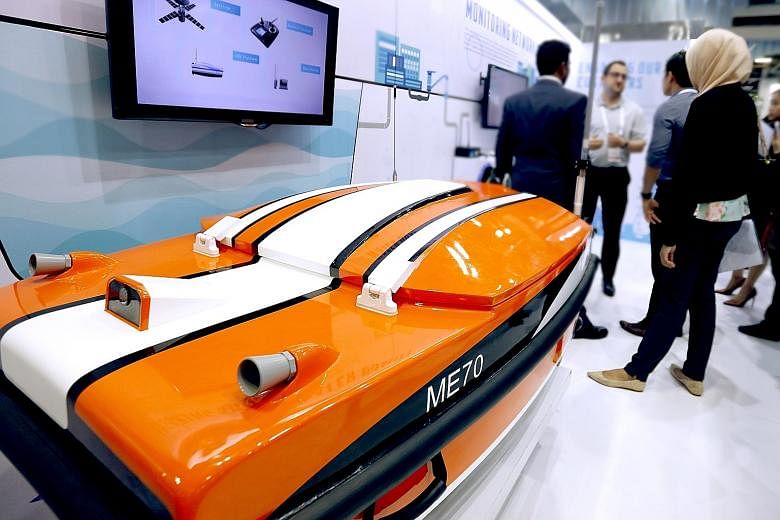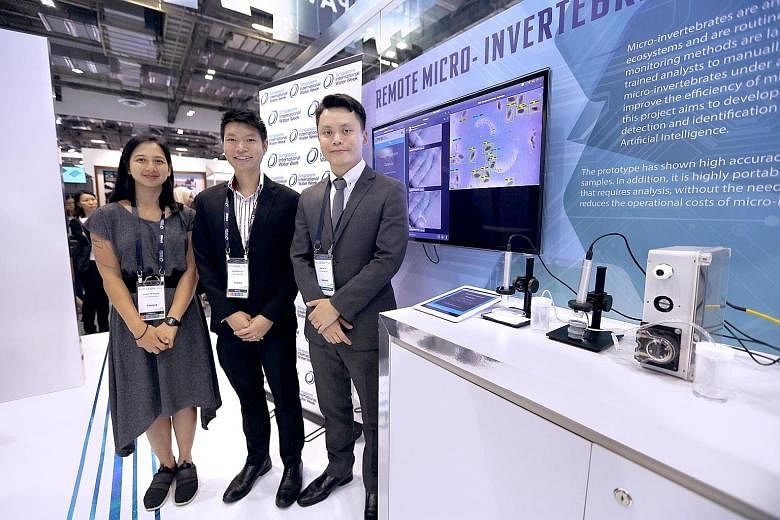National water agency PUB launched a five-year road map yesterday to digitalise Singapore's water system in the light of constraints such as increasing demand, rising operational costs, manpower limits and climate change.
The road map leverages tech-nology such as self-piloting boats to monitor water quality or artificial intelligence that can identify insect larvae species almost im-mediately as ways to boost efficiency and productivity.
Similar to the agency's robot swans, the self-piloting boat will monitor the quality of water. It can measure indicators such as acidity, temperature, oxygen levels and the presence of algae.
Unlike the swans, which operate in reservoirs, the boat can withstand waves of up to 2m in height and PUB hopes to deploy it in the seas around desalination plants.
"With desalination as a source of water for us, there is a need to monitor water from the sea more closely," said the PUB's chief information officer Michael Toh.
The boat is currently being tested at Pandan Reservoir.
PUB is also testing a system that can identify the presence and species of insect eggs and larvae in water. Dragonflies, for instance, are extremely sensitive to pollution and their presence can tell how healthy an environment is.
PUB microbiologist Martin Tay said that if the sensor detects a sudden drop in larvae or eggs, it can alert the agency immediately to let it know that something is wrong.
Dr Tay added that trained microbiologists are currently needed to manually identify eggs and larvae, with each sample taking two hours to analyse.
The water agency will start training the system to differentiate different species of eggs and larvae, and plans to start deploying sensors around reservoirs by 2020.
PUB is also looking at installing a pre-emptive leak management system to tackle the issue of pipe leaks, which have led to water gushing out on roads and traffic disruptions several times in the past 12 months.
Sound will play a key role in the system, which will consist of sensors placed along a length of the piping network.
By knocking on the pipes and calculating how long sound takes to travel from one sensor to another, PUB will be able to tell how thin - and hence corroded - a pipe has become from the inside, and can then decide if it needs to be either reinforced or replaced.
PUB's latest announcements come amid a broader move to leverage technology in the environment and environmental services sector. French energy management and automation company Schneider Electric, for example, is using the Internet of things to improve the sustainability of water and wastewater plants.
"While the long-term impact of digitalisation is difficult to predict, we believe that through technology, an ecosystem can be built which helps customers re-duce their own energy consumption by 30 per cent through active energy efficiency and sustain-ability solutions," a company spo-kesman said.
PUB's Mr Toh said: "Business as usual is not sustainable. Not adopting new technology exposes us to inefficiencies and risk, and can render us obsolete or unable to adapt to technological disruptions."
He added: "Data-driven insights will also help PUB attain higher levels of operational efficiency, improve our incident response times and ultimately serve our customers better.
SEE SCIENCE



